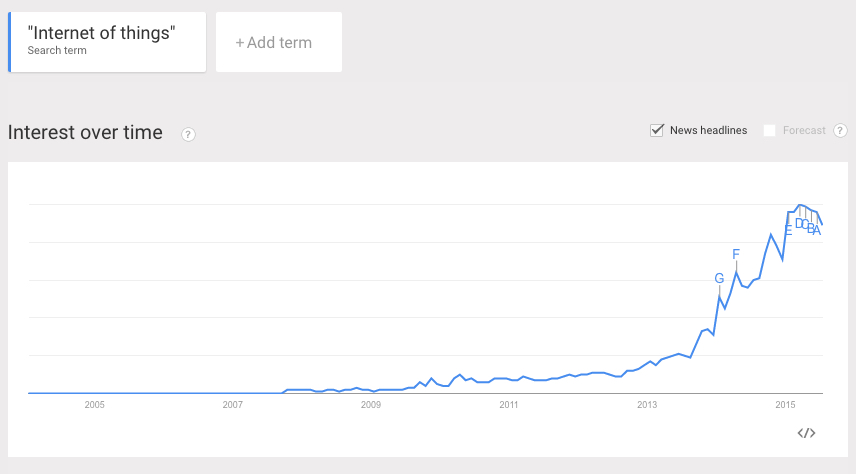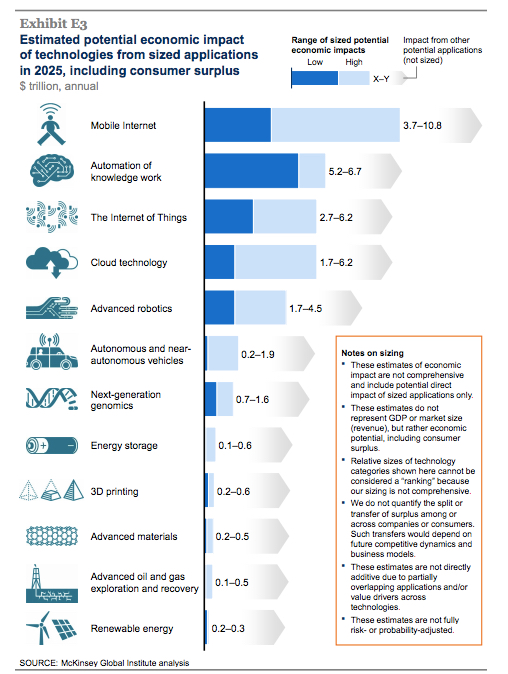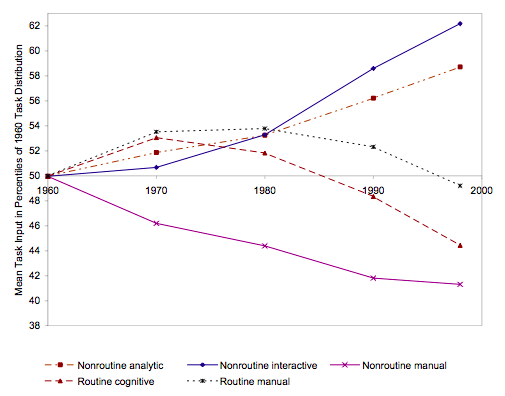I’m watching futurist Gerd Leonhard‘s June 23rd 2015 talk in London titled Future of technology and-with-versus humanity: Future of Business (terrible audio quality, sorry) and something jumped out and caught my eye. Â (Leonhard is one of the world’s most influential futurists, among top futurist peers like Andy Hines, Paul Higgins and John Smart.)
It was a statistic about the Automation of Knowledge Work, and it was on a slide referencing the May 2013 McKinsey Global Institute report titled Disruptive technologies: Advances that will transform life, business, and the global economy. There are 12 different types of technology discussed but automation of knowledge work is defined as “Intelligent software systems that can perform knowledge work tasks involving unstructured commands and subtle judgments.”
McKinsey said in 2013 that automation of knowledge work is going to have the one of the largest economic impacts around the world of any of the most disruptive technologies over the next 10 years, impacting the $9 trillion dollars that makes up 27% of global employment costs that go to knowledge workers.
Interestingly, at least as of 2 years ago, the hype-to-potential discrepancy that McKinsey saw was intense. Look at this chart:

That’s right, automation of knowledge work is expected to have one of the very highest economic impacts of all these disruptive technologies – but is the very-least discussed among general interest and business publications. What does that mean? I think it means “get in now,” for one thing.  High potential, low hype sounds like an opportunity for arbitrage against the future.
I bet if you redrew this chart two years later, for example, Internet of Things would have shot way up the Y-axis, as suddenly media and big companies have gotten very excited about it. Â (For what it’s worth, I was writing extensively about IoT more than 5 years ago in 2010, this being my favorite post: an interview with Chetan Sharma about How 50 Billion Connected Devices Could Transform Brand Marketing & Everyday Life.)

As someone who’s at-root interested in building technology that automates knowledge work, I’m pretty interested to read McKinsey’s findings on its disruptive potential. (“This is not a market size,” the report emphasizes.)
That size of potential market to impact just below mobile internet and above (though they insist these aren’t rankings) cloud computing, robotics, and more. Higher total numbers are cited for the Internet of Things, which could impact $36 trillion in operating costs of healthcare, manufacturing and mining, and the $11 trillion in global manufacturing GDP that could be impacted by 3D printing.
 McKinsey: “Advances in artificial intelligence, machine learning, and natural user interfaces (e.g., voice recognition) are making it possible to automate many knowledge worker tasks that have long been regarded as impossible or impractical for machines to perform. For instance, some computers can answer ‘unstructured’ questions (i.e., those posed in ordinary language, rather than precisely written as software queries), so employees or customers without specialized training can get information on their own. [Me: I’m especially interested in things like subjective judgement that used to be exclusively the domain of humans.] This opens up possibilities for sweeping change in how knowledge work is organized and performed. Sophisticated analytics tools can be used to augment the talents of highly skilled employees [Me: Now we’re talking! Let’s talk about things that weren’t even possible before!], and as more knowledge worker tasks can be done by machine, it is also possible that some types of jobs could become fully automated.”
McKinsey: “Advances in artificial intelligence, machine learning, and natural user interfaces (e.g., voice recognition) are making it possible to automate many knowledge worker tasks that have long been regarded as impossible or impractical for machines to perform. For instance, some computers can answer ‘unstructured’ questions (i.e., those posed in ordinary language, rather than precisely written as software queries), so employees or customers without specialized training can get information on their own. [Me: I’m especially interested in things like subjective judgement that used to be exclusively the domain of humans.] This opens up possibilities for sweeping change in how knowledge work is organized and performed. Sophisticated analytics tools can be used to augment the talents of highly skilled employees [Me: Now we’re talking! Let’s talk about things that weren’t even possible before!], and as more knowledge worker tasks can be done by machine, it is also possible that some types of jobs could become fully automated.”
Later, the report says: “Automated knowledge work tools will almost certainly extend the powers of many types of workers and help drive top-line improvements with innovations and better decision making.”
Again, as someone whose company is building technology used by enterprises for expert discovery, detection of emerging knowledge and related marketing opportunities, I’m excited about that.
But as a human being who is excited about building, hopefully sharing widely and personally experiencing augmented cognition, I’m even more excited.
PS. This reminds me of one of my favorite graphs around skills, from the OECD several years ago, demonstrating that the only skills that have grown instead of declined over the past 50 years are non-routine analytic and non-routine interactive. I don’t know how I feel about this politically, I certainly think that non-ambitious people most interested in doing routing work deserve to be able to support a family with dignity and freedom, not in poverty, but this is a pretty darned interesting graph.
